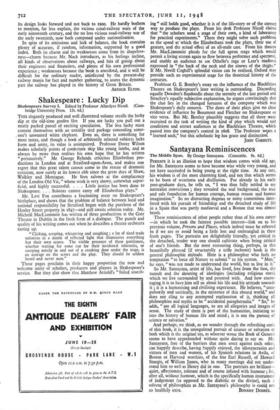Santayana Reminiscences
The Middle Span. By George Santayana. (Constable. 8s. 6d.)
PERHAPS it is an illusion to hope that wisdom comes with old age, for Mr. Santayana seems to have become wise while very young, and yet have succeeded in being young at the right time. At any rate, his wisdom is of the most charming kind, and not that which seems to be born of weariness and disillusion. For already in his early post-graduate days, he tells us, " I was thus fully settled in my naturalist convictions ; they revealed the real background, the true and safe foundation for human courage, human reason and human imagination." So no distracting dogmas or noisy contentions inter- fered with his pursuit of friendship and the detached study of life in a Spain that was partly mediaeval and a Boston that was almost brash.
These reminiscences of other people rather than of his own career —in which he took the faintest possible interest—link on to his previous volume, Persons and Places, which indeed must be referred to if we are to avoid being a little lost and embrangled in these fresh pages. The portraits are delightfully friendly, yet critical in the detached, tender way one should cultivate when being critical of one's friends. But the most reassuring thing, perhaps, in this beautifully phrased (if structurally a trifle inchoate) book is the general philosophic attitude. Here is a philosopher who feels no temptation " to force all Nature to submit " to his system. " Man," he says, " was not made to understand the world, but to live in it."
So Mr. Santayana, artist of life, has lived, free from the fuss, the tumult and the shouting of ideologies (including religious ones), which we live surrounded by and pestered with. And how encou- raging it is to have him tell us about his life and his attitude towards it ; it is a humanising and civilising experience. He believes, "com- pulsorily and satirically, in the existence of this absurd world," and does not cling to any attempted explanation of it, thinking all philosophies and myths to be " accidental paraphernalia." " So," he adds, " are all logical languages, so are all allegories and images of sense. The study of them is part of the humanities, initiating us into the history of human life and mind ; it is not the pursuit of science or salvation."
And perhaps, we think, as we wander through the refreshing oasis of this book, it is the unregulated pursuit of science or salvation or both which is the original sin, as whoever wrote the Book of Genesis seems to have apprehended without quite daring to say so. Mr. Santayana, free of the barriers that men erect against each other, can happily describe, having happily enjoyed, the idiosyncrasies and
virtues of men and women, of his Spanish relations in Avila, of Boston or Harvard worthies, of the late Earl Russell, of Howard Sturgis, of William James, who in many meetings did not under- stand him so well as Henry did in one. The portraits are brilliant—
quiet, affectionate, tolerant and of course infused with humour ; for, after all, without humour, which is the specifically human instrument of judgement (as opposed to the diabolic or the divine), such .1 solvent' of philosophies as Mr. Santayana's philosophy is could not






























 Previous page
Previous page